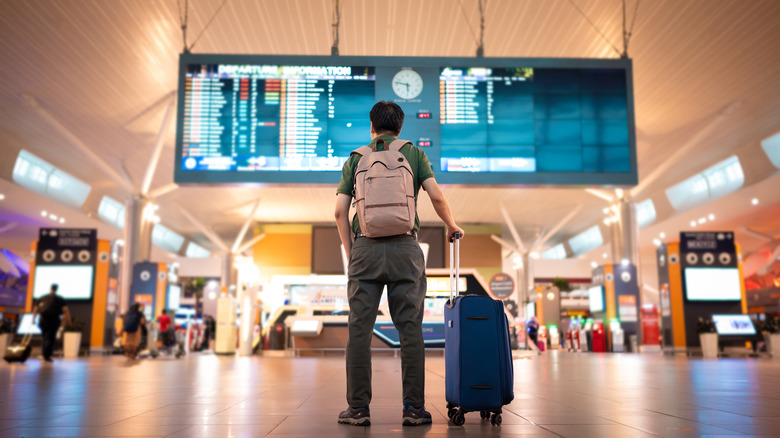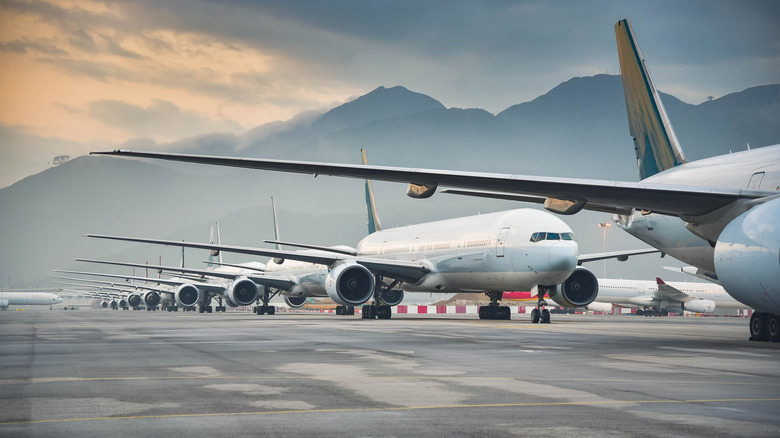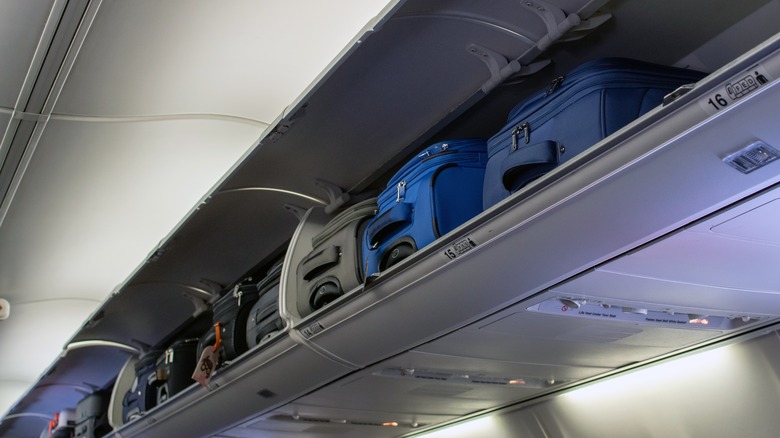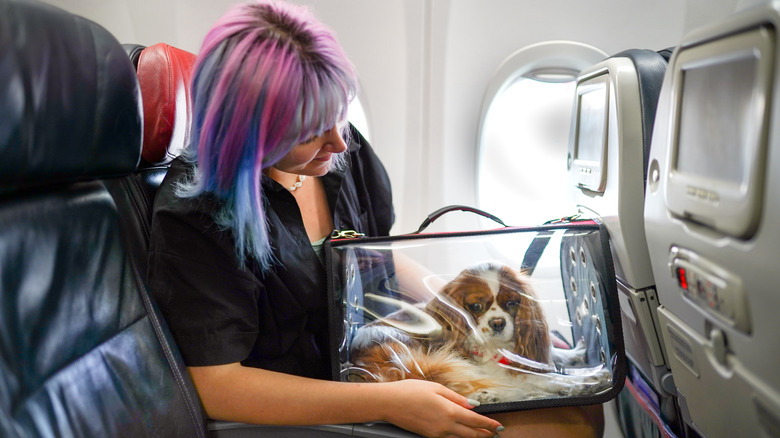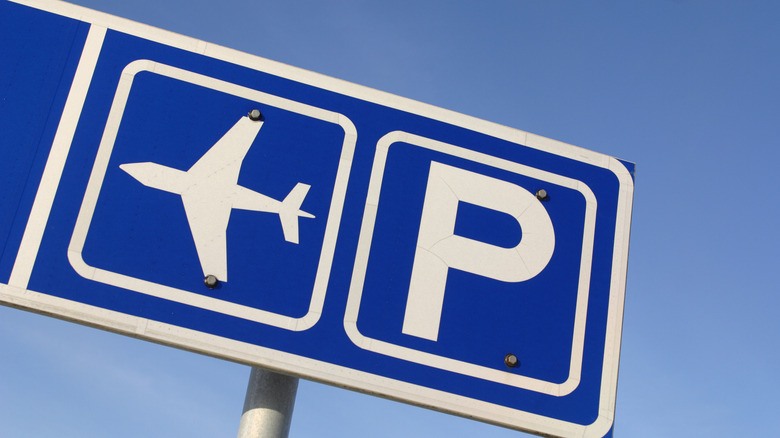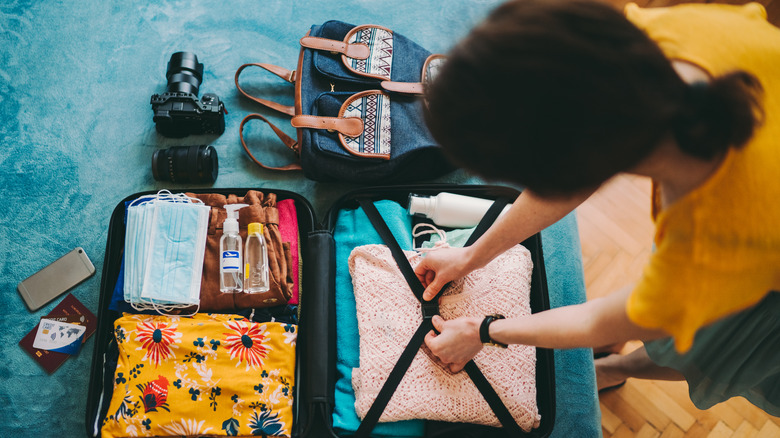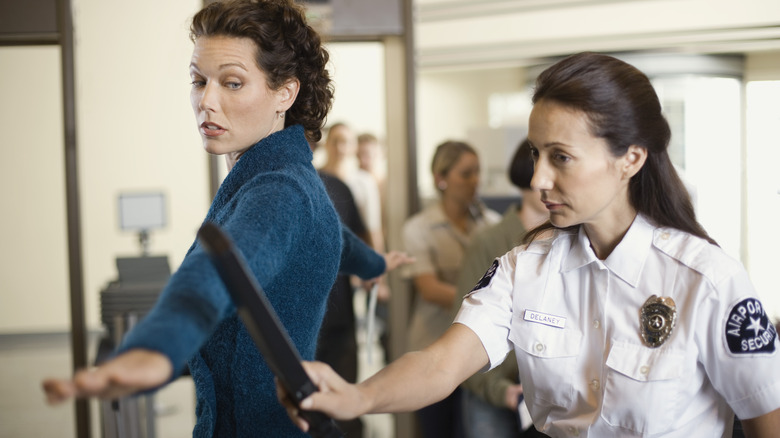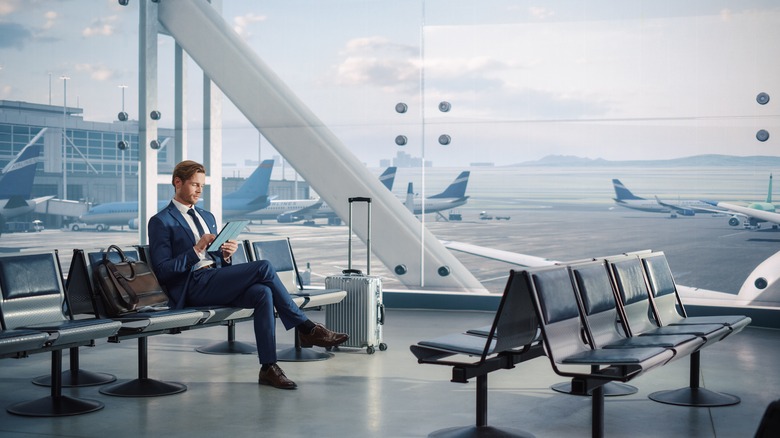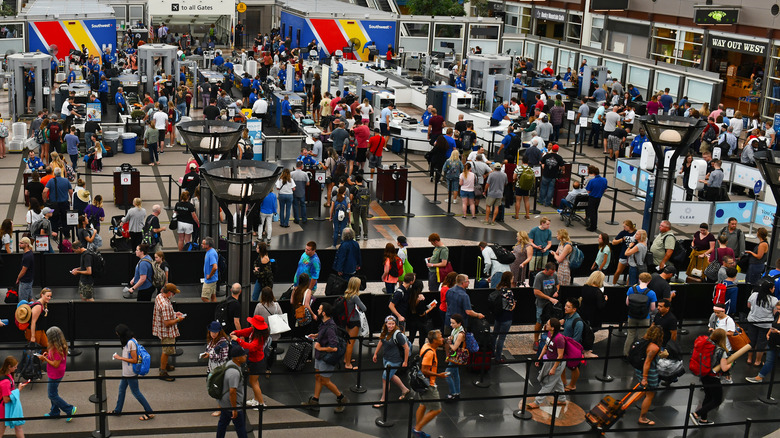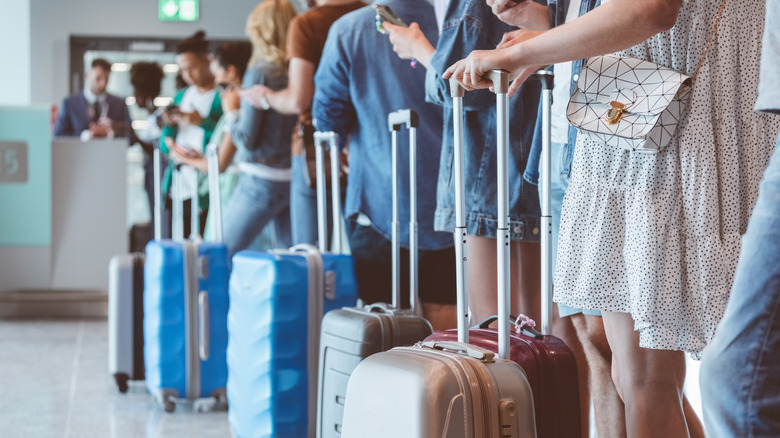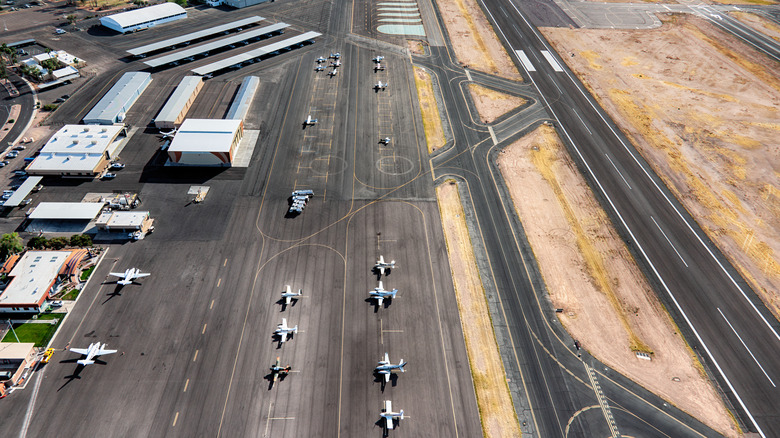How To Navigate Busy Airports During The Holidays
Who doesn't love the holidays? It's a time when families and friends congregate to celebrate reuniting again at a special snapshot of the year. Given that families are much more dispersed than a generation ago, these are often the only periods in a year when parents or grandparents get to see their children and siblings have a moment to catch up properly. No surprise, then, that holidays are when roads, trains, and planes are packed, teeming with people rushing to get somewhere by a specific date.
Many choose to fly for the holiday because, let's face it, we live in a big country where states like California are larger than many European countries (including Germany and Italy). The upshot is that airports take on a completely different atmosphere during the holidays — lines are longer, seats at gates are at a premium, and tempers are prone to rupture. But, with some foresight and careful planning, the experience of flying during the next big holiday doesn't have to vex the soul.
Book well in advance
It goes without saying that demand will be high during the holiday periods, so unless you want to pay an exorbitant price for your flight, reserve your ticket well in advance. An easy rule of thumb is that as soon as you have decided to travel over the holidays and set your dates, book the flight on the spot. Some airlines allow you to book almost a year before the flight date, and while that might seem a long way away, time does have a habit, a bit like a plane, of just flying by without you knowing. Tickets are generally governed by supply and demand, and the earlier you make your reservation, the higher the pool is likely to be and the cheaper the ticket.
When looking at flight options, choose an early bird. These are the ones least likely to be delayed, a fact that statistics back up. According to the August 2023 Air Travel Consumer Report, produced by the Office of Aviation Consumer Protection (part of the Department of Transportation), flights from the nation's largest 30 airports that departed between 6 a.m. and 7 a.m. left on schedule 87.3% of the time. Compare that with flights departing between 7 p.m. and 8 p.m., where the comparable figure was 52.6%.
Streamline your ticket
Since holidays seem to be getting more and more compressed each year, time is clearly at a dividend, meaning that every moment wasted seems to amplify itself. With that in mind, do you really need to spend time packing a large piece of luggage to lug to the airport, drop it off at the terminal, and then find yourself waiting at the other end to pick it up off the carousel? What's more, do you need the stress — something already high during the holidays — over worrying that it will get lost en route (almost 1.5 million suitcases were mishandled by U.S. carriers in the first half of 2023)?
The smart traveler will squeeze all their belongings into a carry-on bag during the holiday season, making the airport process quicker and movement at arrivals more efficient, with no time stuck at a baggage belt. Better yet, since most airlines now charge passengers to check in a suitcase, you will save money by taking a carry-on, funds which can go toward a gift for your family.
Check the pet requirements
Pet owners will insist that their furry friends are as much a part of the family as those with whom they share DNA. For many individuals, traveling with a pet is a normal part of the holiday trip, and some fliers wouldn't dream of leaving their pooch behind during this special time of the year. And yet, when it comes to booking, airlines treat pets differently from people. You can't simply purchase an extra seat for them as if they were a human traveler. Confirm well in advance what an airline needs to allow your pet on the flight. While this varies from carrier to carrier, they generally allow smaller pets on board in a specially designed carrying case, which must meet specific dimensions, and larger pets must go in the cargo hold.
Airlines will also charge a fee for each pet. For a pet that travels in the cabin with its owner, that case counts as the owner's carry-on bag allowance. Again, fliers must sort out their pet booking early, especially since some airlines limit the number of furbabies allowed on a flight. Don't wait until the last minute to find out that there is no more space on the plane to accept your beloved baby.
Give credit to your card
A credit card is certainly a handy financial tool, allowing us the flexibility of stacking up a series of purchases to be paid off later. Many come with rewards and perks, like points, cash back, and air miles, and some even supply great benefits that will effortlessly ease the airport experience. For instance, the American Express Platinum card gives cardholders $189 in credits towards payment of the CLEAR membership, an expedited security screening interface used at airports nationwide. It is now used at sports and concert venues. Additionally, the card will give its holder $200 in credit against airline tickets each year, a saving that will certainly ease the strain of holiday travel.
Users of the Chase Sapphire Reserve card can also get funds back against streamlined security protocols like Global Entry, as well as $300 for any purchases made on travel each year. In addition to these bonuses, the number of points earned per dollar can multiply when used to buy travel, making a holiday trip numerically worth it.
Do some math
Even if you've snagged a great airfare and saved a ton of cash, don't see this as a barrier to being careful with the rest of your holiday outlay. Getting to the airport without making a serious dent in your bank balance might not be as easy as it sounds, especially during the holidays when demand for taxis — and its effect on surge pricing — tends to rocket. Take some time well before your departure date to work out how to get to the airport. If you've taken our advice and are traveling with only hand luggage, consider public transportation, like an airport shuttle bus or train, which runs on a regular schedule and charges a fixed rate.
If that isn't an option, and the easiest way to reach the airport is by driving, look at all the parking options near the terminal, the airport's long-term parking facility, or even an off-airport site that transfers passengers via an independent shuttle bus. For airport lots, booking a spot in advance will likely get you a better rate than booking at the last minute, when spaces might not even be available. When a cab is the only option, call the cab company a few weeks before the flight and confirm the pick-up time and location. Call once every week thereafter to double-check the booking. Better safe than stuck at home.
Pack smartly
Long gone are the days when passengers could put anything in their carry-on bags and waltz through security without a care in the world. In the current era of flying, security is thorough and very clear in its guidelines, so passengers can't realistically feign ignorance of the rules. Shoes are always taken off at screening, so choose ones that are easy to slip off — if this means nixing those lace-up boots that rise to your knees, then so be it. While liquids packed in a clear bag typically don't have to be taken out of your carry-on luggage, be aware of the limits on the amount you can carry.
Refillable water bottles can be brought onto the flight, but these must be empty during screening. Also, pay attention to what is considered liquid and what isn't. Cost-conscious passengers like to pack food or snacks for the flight, but items like yogurt and honey are considered liquids and will count toward your liquid allowance. The items that travelers usually need to remove from their bags are laptops and large electronics, so when packing, have them handy so they can be easily pulled out.
Download at home
Staying connected in airports has become easy with the advent of free Wi-Fi at most destinations, a boon for families that want to check on each other during the travel process. Airport Wi-Fi can be surprisingly fast, but that doesn't mean it's always safe. As with any public wireless internet, the networks are open to hackers, and people around you could have access to your information.
So, if you want to download music or entertainment to listen to or watch during the travel time, do this at home, not at the airport when sitting at the gate while getting ready to board. If you really must use the airport Wi-Fi for anything that is vaguely personal or sensitive, be sure to access it via a VPN, which adds a layer of encryption to the transfer of data, making it harder for miscreants to get their hands on your details.
Beat the clock
A lot of time at the airport is spent in line checking in, queuing up for security, and sitting by the gate before being allowed on the plane. While this may seem tedious, many passengers forget all that goes on behind the scenes to ensure that their bags, food, cabin crew, and clean seats are ready when stepping on the aircraft. The rule is to arrive at the airport two hours before a domestic flight and three hours before an international flight, but that doesn't preclude you from getting there even earlier.
Sure, you may have longer to wait in the terminal, but given the crowds that crush airports during the holidays, arriving ahead of the expected timeframe will give you peace of mind and ensure you don't miss your flight. The TSA always sees an uptick in passenger numbers during the holidays, and while that might not be a surprise, it's something that many travelers still wilfully ignore.
Stay focused
Airports during holidays are havens of sensory overload, places where parts are constantly moving, and even more people surge through concourses. Look around, and you'll see counters, kiosks, signboards, stores, restaurants, public facilities, stairs, escalators, visitors with different needs, and planes docked at gates. The combination is overwhelming on a normal day but amplifies during a holiday. The key to surviving this transitory obstacle course is to stay focused and calm; do that, and you will swish through the airport like a breeze sweeping through an empty forest. For starters, give yourself plenty of time to proceed through all the steps, so leaving home a little earlier than normal is critical.
Make sure you have checked in online before getting to the airport, and print out your boarding pass or have it loaded on your phone. The earlier you check in (online check-in usually opens 24 hours before the flight departure time), the less likely the airline will bump you off the flight if it is overbooked. Once you have gone through security, head straight to the gate — that way, you will get a seat and be in a prime position to hear about any delays or changes at the gate. While it's tempting to find a bank of empty seats some distance away from your actual gate, this might mean that you won't hear important information about your flight.
Decline the line
Nobody likes standing in line, especially not at an airport, where queues are surprisingly free of any sense of joy — odd considering that everyone in them is about to experience that marvel of modern engineering known as flight. Thankfully, there are several ways to get through screening quicker, although some of these require making a hefty payment in advance, and all necessitate some sort of registration. The most popular programs are Global Entry and TSA PreCheck, both of which cost. The first is aimed at travelers who journey internationally, a way to re-enter the United States and zip through immigration proceedings via a dedicated line.
Within the U.S., Global Entry members can avail themselves of TSA PreCheck, another vetted system that lets enrollees access quicker security, with screening that doesn't require the removal of shoes, belts, laptops, and so on. CLEAR, meanwhile, gets passengers further up the screening line quicker, but unless a passenger has TSA PreCheck, the CLEAR member must go through regular TSA screening. Another free option is the Reserve program, which is only available at select airports in the U.S. This option allows fliers to book a set appointment time for their screening. The benefits, when the holiday lines seem infinite, are self-explanatory.
Use an app
Much of the travel booking experience is moving onto our phones, from the reservation process to the adoption of mobile boarding passes, from push notifications about flight delays to chats with airline agents. Given that, it makes total sense to download your carrier's app. That way, you'll be able to see the gate from which your flight departs and learn of any delays or gate changes. With this option, there is no need to scour the terminal concourse for a giant screen and then scan the screen to identify your flight, only to realize that you are looking at arrivals information instead of departures.
The apps are also sophisticated enough to track your bag, assuming you ignored our earlier advice and checked one in. For frequent fliers, the app will help them track their mileage details, and for all passengers, it can help them find their way around an airport since some feature airport maps that are intuitive and interactive.
Respect others
An airport is a hard place to work, and its staff repeatedly watch as people jet off around the country and the globe while they remain in a giant structure on the outskirts of a city. And yet those employees get you on the flight, feed you while you wait, and ensure your bags go to the right place, time and time again. Yes, they are paid to do so, but they are still doing passengers a service, and fliers should not forget this. It's important always to treat airport staff with respect, especially during the holidays, when an airport nears its breaking point. Airline staff are just there trying to do their job, and that job comes freighted with stringent rules, which is no surprise given the potential dangers of air travel.
A check-in agent has no say in whether a flight takes off on time or if your special meal was ordered, so don't take out your ire on them if things aren't going as you'd expected. They also have no power to change your seat if the flight is full or stop its cancellation because of sudden thunderstorms in the area, so bear that in mind before you go ballistic.
Use a lounge
Sometimes, you need to escape the masses, and an airport during the holidays is one such time. Travelers in the air repeatedly throughout the year can amass enough points in the mileage account to attain a special status in the program, giving them access to the airline's lounges worldwide. But for the more casual traveler, a lounge remains a place often spoken of in hushed awe, viewed as some hallowed ground reserved for deities descending from a celestial realm. In reality, lounges are nothing of the sort, and any flier can get into one, enjoy the space, the comfortable seating, better Wi-Fi, more plush bathrooms (some with showers), and even some decent food and drink.
Passengers can purchase day access to most lounges or even annual membership. In addition, holders of certain credit cards are entitled to complimentary access to a lounge as a benefit of the card. Capital Venture X cards, for instance, come with entry to many lounges across the globe for the cardholder and guests. During the holidays, a lounge can be a haven of peace in an airport that feels like a storm.
Celebrate second-best
You don't have to be wedded to flying from your city's main airport — unless it's the only choice. Many big cities around the country have a secondary airport, a sort of black sheep that doesn't quite hold the allure of its elder sibling. Since it's a secondary airport, it has one major drawback (hint in the wording): offering less service than the major airport, with fewer flights and destination choices. But that also brings a related benefit: it is less busy than the larger hub, even on holidays.
Consider looking at flight options from an overlooked airport, as it might take a lot of the stress out of the holiday travel equation, and the airport might even be closer to your home. Three large international airports serve New York City, but travelers might not know of MacArthur Airport on Long Island, which is served by Southwest and Frontier and is close to a rail station with direct trains into New York City.
